
(By Yang Lu)Beijing Tsinghua Changgung Hospital, one of the centers for the clinical trial of spinal cord electrical stimulator developed by Tsinghua University, has recently undergone spinal cord electrical stimulation therapy for the first subject who has nerve pain after brachial plexus injury. The subject, Mr. Ren, said, "For people like us who have suffered from severe pain for years and almost collapsed, it is big luck even if the symptom could be relieved only 1%."
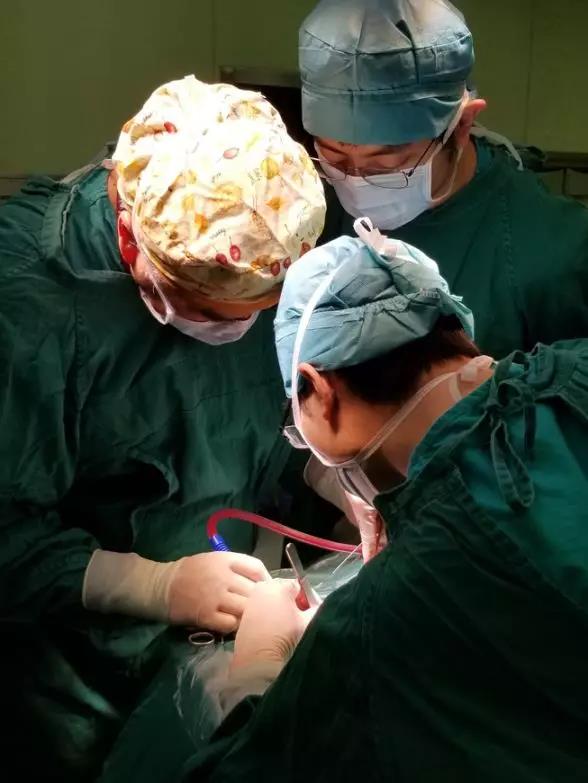
Dr. Jin Wang is performing the operation
Thirteen years ago, Mr. Ren was involved in a car accident and left with a brachial plexus injury, which resulted in, even after multiple surgeries, a complete muscular weakness and chronic pain of his left arm. The pain has worsen in the recent years and couldn’t be controlled by medication, which has seriously affected the life of Mr. Ren and his family. It can be said that he struggles with pain all the time and nearly sleepless. "Pains can really wear down people’s will, especially those chronic, severe, and difficult to treat", said Mr. Ren.
Mr. Ren went to many famous hospitals in Beijing and Shanghai seeking treatment for his pain. Before he came to Beijing Tsinghua Changgung Hospital, he already knew that spinal cord stimulation is a relative advanced and effective treatment for chronic and intractable pain, but he could not receive spinal cord stimulation surgery easily because MRI found multiple cysts in the damaged segments and spinal cord atrophy and deformation. After he learned that Dr. Wang Jin, the vice president of Beijing Tsinghua Changgung Hospital, is an international neurosurgery expert, who has rich clinical experience in treating brain and spinal cord lesions and has been invited back to China to work in Beijing Tsinghua Changgung Hospital , which is one of the Tsinghua University Spinal Cord Stimulator Clinical Trial Centers, he sought medical advice from our hospital.
Before surgery, the patient's pain reached 8-9 score in the Visual Analogue Scale/Score (VAS ), accompanying with a burning sensation and causalgia. The VAS provides a range of scores from 0-10 to describe severity of pain. A score of 4 or higher will affect sleep. A score of 4-6 is like a toothache who wakes you up with pain three or four times during the night. What is the concept of an 8-9 score? It may be like giving birth "all the time," waking up 30 or 40 times at night with pains that keep you up all night, and still having to endure such pains during the day, which is unimaginable to the healthy people.
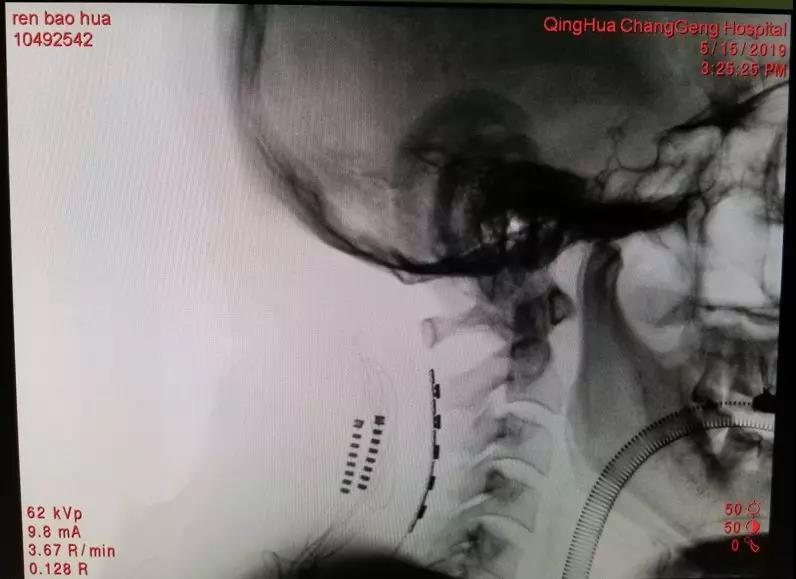
Electrodes accurately implanted in target location
After a thorough evaluation by the neurosurgery team, it was confirmed that the patient was eligible for enrollment in the clinical trial. In addition, due to the past injury and cyst extrusion, the spinal cord was deviated and deformed, which made it difficult for the stimulation electrode to cover the painful area accurately. After meticulous discussions between Dr. Jin Wang and Dr. Guihuai Wang, director of the department of neurosurgery, and clear communication with the patient and his family, the surgical plan was finally decided. On April 25, 2019, the patient underwent endospinal cystectomy, and postoperative examination revealed complete removal of the cyst. However, there is no significant relief of the pain.
On May 15, 2019, Dr. Jin Wang performed the surgery that implant an electrode sheet in the epidural of the cervical spine, using electrical stimulation to block the conduction of pain signals. There are 16 contacts in 3 rows on the tiny electrode sheet, so that electrical stimulation can be controlled precisely after the surgery. During the surgery, they used intraoperative stimulation combined with neurophysiological monitoring to objectively determine the area of pain that can be covered by electrical stimulation. In the end, they used the O-arm to confirm the precise implantation of the electrode in the cervical epidural space. After stimulation testing for nearly a week after surgery, the patient's left upper limb pain relieved by more than 60%. It was difficult for him to sleep before the surgery because of the pain. But after the surgery, he could sleep for 6 hours per night without medication. In accordance with the clinical trial protocol, Mr. Ren went on to receive implantation of a subcutaneous electrical pulse emitter.
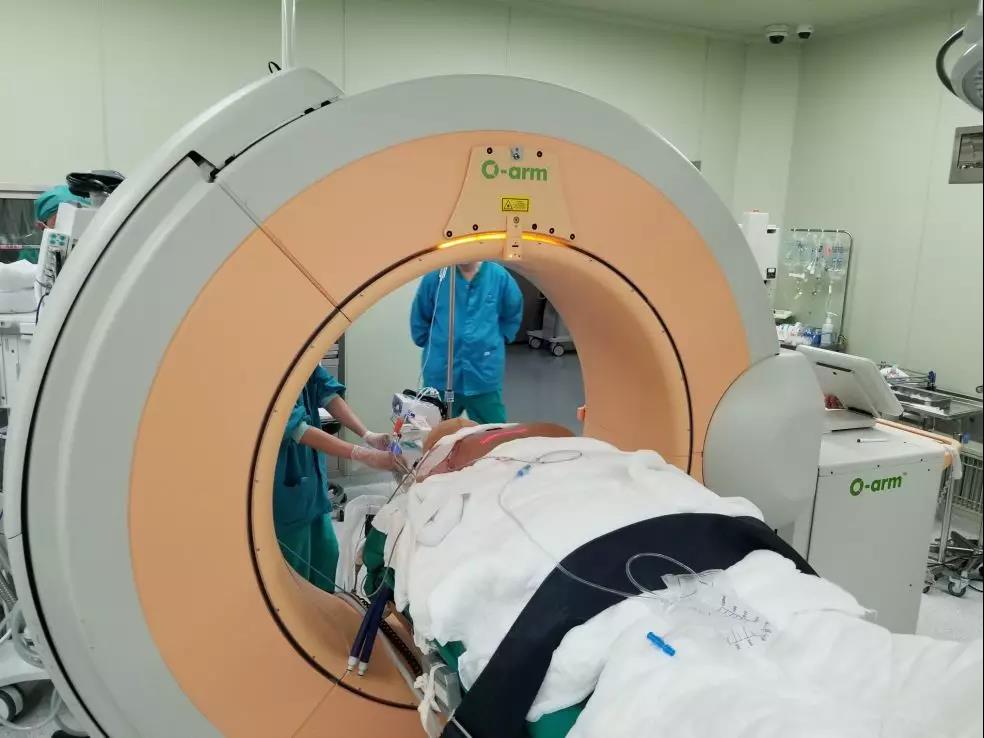
Neurosurgery team used O-arm to confirm the location of the electrode
After two staged surgery and individualized adjustment of parameters, electrical stimulation can precisely cover the most painful areas of the elbow. "The surgery is so successful that the pain is really relieved a lot. Before the surgery, the pain of my left arm also affected my family and put them in pain, but now they can feel better. At least the pain won’t bother them. For people like us who have suffered from severe pain for years and almost collapsed, it is big luck even if the symptom could be relieved only 1%”, Mr. Ren said after the surgery.
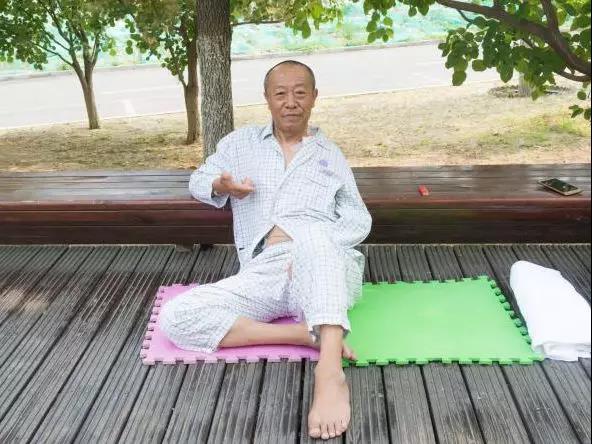
Mr. Ren resting comfortably in the garden of the hospital after surgery
This is the first clinical trial of domestic spinal cord electrical stimulation in the field of neurosurgery in China. The National Engineering Laboratory of Neuromodulation Technology at Tsinghua University independently developed the spinal cord electrical stimulator. The stimulator has been successfully tested in body model and large animal tests, and is currently in pre-marketing clinical trials.
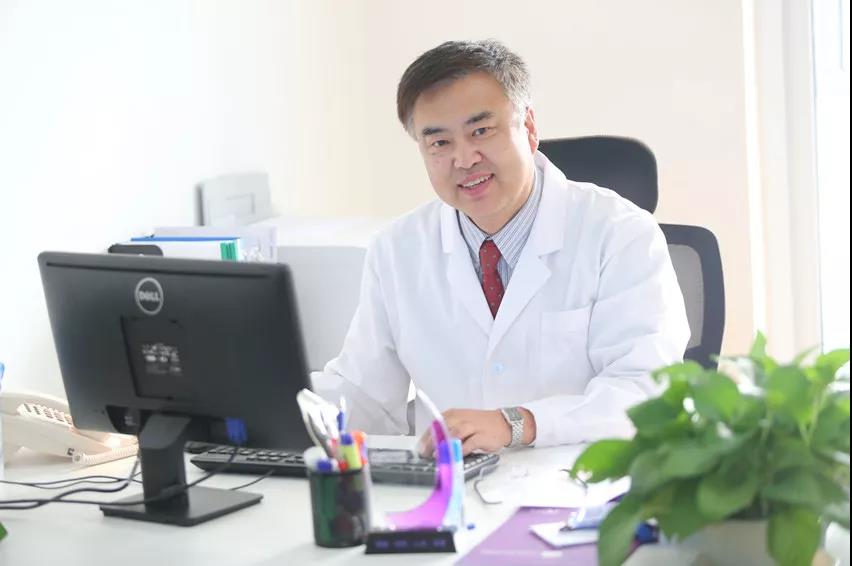
Wang Jin
Chief and Vice President, Beijing Tsinghua Changgung Hospital
Professor of Neurosurgery, Washington University School of Medicine, USA
Chief of Neurosurgery, Swedish Medical Center
Talent Gathered by Beijing Municipal Government
Overseas Experts of Neurosurgery Department of Beijing Tiantan Hospital affiliated with Capital Medical University
Specialties:
Treatment of various brain and spinal cord disorders
Minimally invasive treatment of brain tumors
Comprehensive treatment of gliomas
Stereotactic surgical biopsy of tumors
Minimally invasive destruction surgery
Surgical decompression/fixation of complex spinal degenerative disorders Surgical/comprehensive treatment of spinal cord tumors, cricoid/Chiari malformation, and neuromodulation of Parkinson's disease, tremor, myoclonus, epilepsy, intractable pain, Tourette's syndrome.(Reviewer Bin Shu)